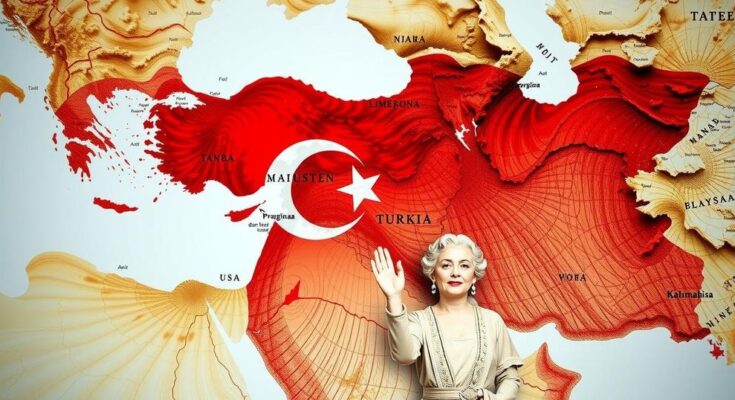Turkey’s influence rises in the Middle East following the decline of the Assad regime, reshaping power dynamics from Syria to Iraq and beyond. Erdoğan’s backing of Syrian rebels, coupled with Iran’s waning support, has established Turkey as a major regional player. Turkey’s strategic maneuvers and diplomatic engagements signify a shift from Iranian dominance, with implications for neighboring nations and the broader geopolitical landscape.
The geopolitical landscape of the Middle East is experiencing a significant transformation as Turkey emerges as a dominant regional player. The downfall of the Assad regime in Syria signals the collapse of Iran’s anticipated “Shia crescent,” while Turkey’s assertive involvement in the region has positioned it as a paramount force. President Recep Tayyip Erdoğan’s unwavering support of Syrian rebels contributed to their unexpected success, as Turkey coordinated resources and protection, contrasting sharply with the destruction prevalent in previous conflicts.
Turkey’s consistent backing for the rebels ensured stability within the northwest region, allowing for rearmament and strategy reformulation amid ongoing hostilities. Concurrently, Iran faces challenges in project capacity due to Israeli military actions, adversely impacting its support to affiliated groups. Furthermore, Russia’s fixation on its own geopolitical challenges rendered it less effective as a defender of Assad’s standing in Syria.
The implications of Turkey’s ascendance are profound, with a cascading effect expected in neighboring Iraq, where a Sunni-led governance in Syria is likely to bolster Turkey’s influence in Sunni-majority territories traditionally influenced by Iran. This shift is compounded by Turkey’s expansive diplomatic maneuvers across Africa, the Caucasus, and Central Asia, illustrating its intent to establish a broader regional presence. For instance, Erdoğan’s successful mediation between Somalia and Ethiopia further exemplifies Turkey’s role in stabilizing regional dynamics.
Turkey’s growing footprint negatively impacts traditional power structures, especially for states such as Saudi Arabia. While Iran’s sectarian-driven narrative was overt, Turkey presents a nuanced Sunni alternative that appeals to a wider demographic within the Sunni Muslim world. Thus, Turkey is effectively undermining Saudi Arabia’s self-anointed leadership within the Sunni domain. This dynamic evokes memories of the 2012 Egyptian political shift, in which Turkey’s influence prompted Gulf states to act decisively against perceived threats.
Previously, the so-called Iranian Shia crescent represented Tehran’s aspirational dominance in the Middle East, stretching from Iran to the Mediterranean. However, the recent developments in Syria symbolically fracture this corridor, further isolating Iranian influence in the region. Indeed, with Hezbollah’s standing in Lebanon eroding, the ramifications of Turkey’s rise become increasingly pronounced.
Turkey’s ascendancy results from not only Iran’s decline but also its commitment to a distinct foreign policy characterized by economic investment and diplomatic efforts rather than purely sectarian motives. As such, Turkey leverages military intervention along with regional cooperation, setting it apart from Iran’s reliance on proxies. This strategy enables Turkey to navigate the delicate sectarian landscape with greater efficacy.
The regional reverberations of Turkey’s influence could provoke significant recalibrations among its neighbors, leading to new alignments and partnerships. Consequently, whether viewed with apprehension or recognition, the contemplation of Turkey’s role as a pivotal Middle Eastern actor is now paramount for both regional players and Western policymakers moving forward.
The future operations and contests of influence in the Middle East will increasingly revolve around Turkey’s ambitions rather than those of Iran, shifting the focal point of regional power from Tehran to Ankara.
The Middle East has historically been characterized by complex power dynamics, particularly influenced by sectarian rivalries between Shia and Sunni communities. Iran’s establishment of a ‘Shia crescent’ aimed at connecting its influence across several Arab nations marked a significant shift in regional geopolitics. In recent years, however, Turkey’s surge in support for Sunni groups, particularly amid the Syrian conflict, has significantly altered this narrative. As Turkey consolidates its influence across multiple regions, including Syria, Iraq, and beyond, it is seen as a counterbalance to Iran’s previously unchallenged reach, impacting allies and adversaries alike.
In summary, Turkey’s ascension represents a transformative phase in Middle Eastern geopolitics, where its evolving role may redefine regional power balances. In contrast to Iran’s sectarianism, Turkey’s multifaceted approach—hinged upon cooperation, economic partnerships, and direct support for local Sunni forces—positions it as a compelling alternative in the region. This shift not only presents challenges to traditional powers, such as Saudi Arabia and Iran, but also necessitates a reevaluation of diplomatic strategies among international stakeholders as they navigate the new landscape shaped by Turkey’s ambitions.
Original Source: www.theguardian.com




